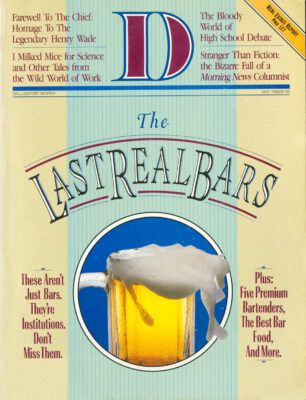ONE FINE FEBRUARY evening, Vassil Kasashki says, he was walking through the Galieria parking garage after work. A
dark-haired, black-suited gentleman asked him for a light, seemed nervous when Vassil said he didn’t smoke, followed
him to his car, and then shoved a carton of cigarettes against his right arm. Protruding from the bottom of the
carton was a needle. In a matter of minutes, Vassil was very, very sick.
Vassil sucked the poison from his arm, called his roommate for help, and spent the next several hours at the
hospital, where doctors monitored his-weak heart rate until he had passed the crisis.
It was at that moment, he told me a month later, the moment when he realized the Bulgarian secret police were trying
to kill him, that he decided to write his next book.
“It will remove the mask of Communism,” he said in broken English. “I must explain the Communist system to
America.”
I didn’t have the heart to tell him, but the commercial chances of his book on Communism are roughly equal to those
of The Merv Griffin Cookbook. No-worse.
Vassii Kasashki is that sad species, the political refugee too new to this country to know yet how little his
freedom matters to us. He will go through a period of euphoria-he is amazed at the freedom of travel, the kindnesses
of strangers, the ease of getting a job. and the relative comfort of his life. Then he will begin to notice the
blank stares when he describes how he escaped Bulgaria with all his manuscripts packed into a knapsack and bolted
for the American embassy in Istanbul. For the first two or three years, he will tell every American he meets about
the horrors of Communist life- and watch them turn his story into cocktail-party anecdotes. He will dream of writing
the ultimate book on Communism. Perhaps he will write it. He will die a free man. still full of zeal, but without
vindication. He will end up merely puzzled. Worse yet, he may begin to understand. Then he will feel bitter and
betrayed.
Vassil Kasashki is a small fish in the brutal game of international politics-just dangerous enough for the paranoid
Bulgarians to assassinate, but not valuable enough to be of any strategic value to the West. He has only one
advantage over the thousands of other Bulgarians who have vanished from their country over the past ten years:
Vassil Kasashki knows how to write.
BORN FIFTY-NINE years ago in a tiny village near the Danube. Vassil led a privileged, if undistinguished, life. He
began and ended his government career as an accountant supervising fifty accountants charged with the administration
of offices, factories, hospitals, and schools. Vassil fared quite well for himself, his wife Jovana. his son
Valentin, born in 1950, and daughter Malina. bom five years later. He had two cars, a city home, a country home, a
salary that provided all he needed. The only thing the government didn’t take care of was his anger.
One day in 1979, Vassil started writing a novel. It was the first time he had tried to write since he was in high
school-but this time his story was ready-made. One of Vas-sil’s friends was a doctor, a beautiful woman. While
attending medical school, she had fallen in love with a young man who offered to take care of her as long as it took
her to get her degree and get started in medicine. They were married as soon as she started to practice, and she was
assigned to a remote border outpost that was temporarily without doctors. One day an injured and bloodied man showed
up in her office, asking for treatment. He was obviously a refugee, probably someone who had jumped the border from
Romania. She treated him and sent him on his way.
A few days later a local Communist Party official came to visit her and asked why she hadn’t reported a stranger in
her office. She replied that he was just a patient to her and that she hadn’t known it was required to report him.
She was nevertheless charged as an accessory to espionage (minimum sentence: fifteen years)-but just before her
trial, the local police chief told her he had the power to stop the proceedings. The price, he
Get our weekly recap
Brings new meaning to the phrase Sunday Funday. No spam, ever.
Related Articles

Arts & Entertainment
DIFF Documentary City of Hate Reframes JFK’s Assassination Alongside Modern Dallas
Documentarian Quin Mathews revisited the topic in the wake of a number of tragedies that shared North Texas as their center.
By Austin Zook

Business
How Plug and Play in Frisco and McKinney Is Connecting DFW to a Global Innovation Circuit
The global innovation platform headquartered in Silicon Valley has launched accelerator programs in North Texas focused on sports tech, fintech and AI.

Arts & Entertainment
‘The Trouble is You Think You Have Time’: Paul Levatino on Bastards of Soul
A Q&A with the music-industry veteran and first-time feature director about his new documentary and the loss of a friend.
By Zac Crain


